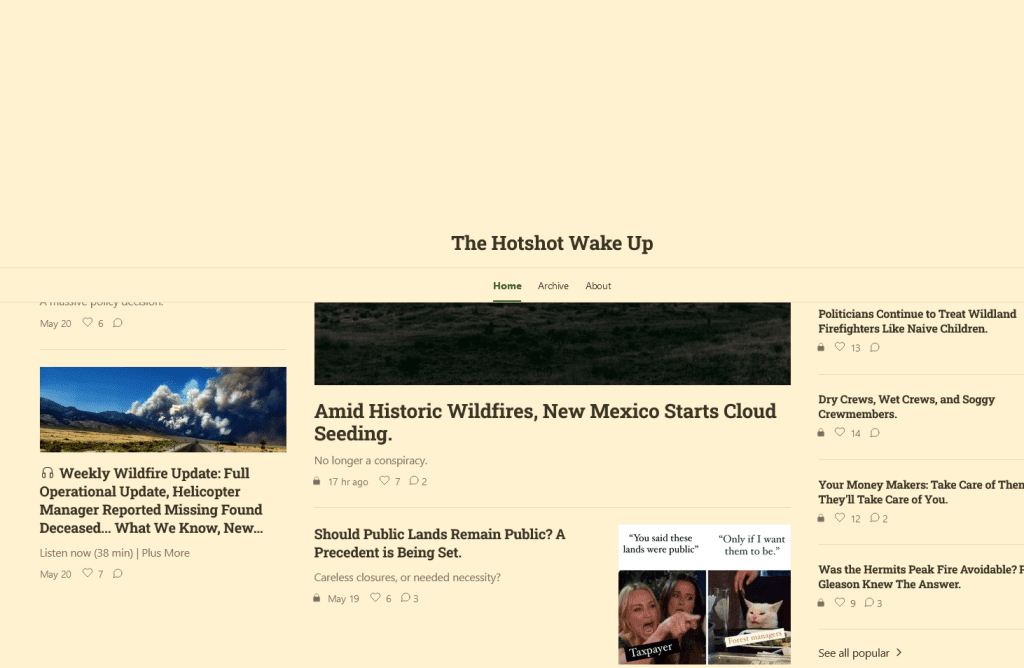I’ve been thinking about trust quite a bit, mostly with regard to prescribed and Wildfire With Benefits. But then the First Street Foundation study came up. I discovered on Twitter an interesting substack called The Hotshot Wakeup. The person who runs it has a unique and interesting take on this. Check this podcast out around 21:38, or start sooner if you’re interested in wildfire news. I was unable to find out who this individual is (nor their pronouns) so.. I will call them THW and use they/their pronouns until I find out differently.
THW questions the FSF study and let’s look at some of hizzer concerns.
1. It came to our attention through a focused media push via a great variety of outlets.. blizzardy. That takes money and influence. So who is behind it and to what end? He mentions bot accounts. As an Old Person, sadly, I don’t understand how that might work.
2. It came through a foundation that has traditionally not been in the fire space. It is interested in “climate risk” and has previously been interested in coastal flooding.
3. It does not seem to ground-truth well.
4. “THW describes how outlets and other folks have interpreted it. Shouldn’t let people live there until we can take their ignorance away” “too late to have the public learn about these things” I don’t know which stories he read but he mentioned people quoted in California and Montana, but I am curious.
5. THW mentions UN Wildfire Policy which had had covered elsewhere in another podcast but I couldn’t find.- They suggest FSF study kind of pushes the same policy.. shouldn’t live in rural areas, should tax people if they want to live in those areas.
The way the actual information is carried forward seems to be promoting a agenda of.. well, listen to the way he tells it. Then there’s those who think it’s for insurance companies to raise everyone’s rates, and so on.
*********************************************
So what could they have done to build trust? I’m not a trust expert, but here are some ideas. You are invited to add yours.
1. Be open about their goals before they start. You are entering the fire modeling science space, already occupied by numerous inhabitants funded by a plethora of different government agencies and others. Why? That way people can track whether your actions and approach follow from your stated goals.
2. Be open about funding sources. No one wants to read 990’s.
3. When you enter someone else’s space (unless you are intending to invade in the name of Climate) be polite to the natives. Enlist existing experts on a broad scale (social scientists, fire behavior folks, practitioners) for advice prior to generating models.
4. Use open peer and practitioner review of models and conclusions. I’m not sure how comfortable scientists feel critiquing something now, when it’s effectively too late. Peer review by journals doesn’t actually impress many of us who have observed this.
5. Ground truth openly before release.
6. Be open about what’s not included. Especially when that includes human behavior (aka ignitions, suppression), new suppression technologies, and other adaptation strategies. To say things like “climate will make it x% worse (future prediction)” without including “but these other factors will also change (future predictions) is really, really common in the climate space. I think it’s because people are difficult to model, or that it’s easier to invade the wildfire space from the physical model world which tends to ignore the social science world.
*****************************************
If these had been done, you would arguably have not needed a media push, as the information would be integrated into communities via their own trusted sources and opinion leaders. This is the way of helping people learn that the technology transfer and extension communities have worked with for years.
